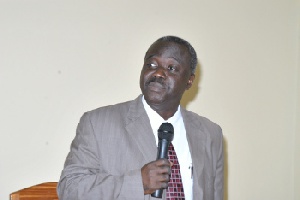Professor John Gyapong, University of Ghana, Pro-Vice Chancellor in-charge of Research, Innovation and Development, has urged government to promote scientific research through funding for the country to attain the desired socio-economic development.
He said in developed nations and most emerging economies, governments have been playing crucial roles in funding science and technology research in their tertiary institutions, which serves as the basis for their technological advancement.
Prof. Gyapong made these remarks in an interview with the Ghana News Agency on the sidelines of the World Bank’s Africa Centres of Excellence (ACE) Project launch in the Nigerian capital, Abuja.
He said Ghana’s development could be accelerated through a scientific and technological innovation and a strong educational system, hence, the need for government to prioritize funding research in higher education.
He said science and technology is the driver of economic development, however, training people in them is an expensive investment that requires infrastructure and equipment, which are usually procured with hard earned currency.
The Pro-Vice Chancellor lauded the World Bank for coming out with the ACE Project, but said, however, that in order for the nation to get the best out of it, governmental support was critically needed.
Prof. Gyapong said the University of Ghana had repositioned itself as a world class research university, to enable it produce quality and better graduates.
He said the University’s West Africa Centre for Crop Improvement (WACCI) and the West Africa Centre for Cell Biology of Infectious Pathogens (WACCBIP), which won the ACE Projects, would impact greatly on Ghana and the sub-region’s socio-economic development.
The Pro-Vice Chancellor said WACCI would train highly qualified people in plant breeding to help address the shortage of plant breeders in the sub-region while WACCBIP would train people to control and manage diseases such malaria and tuberculosis.
The University of Ghana is the only institution in West and Central Africa that won two grants each worth eight million dollars, in the ACE Project.
Regional News of Monday, 26 May 2014
Source: GNA

















